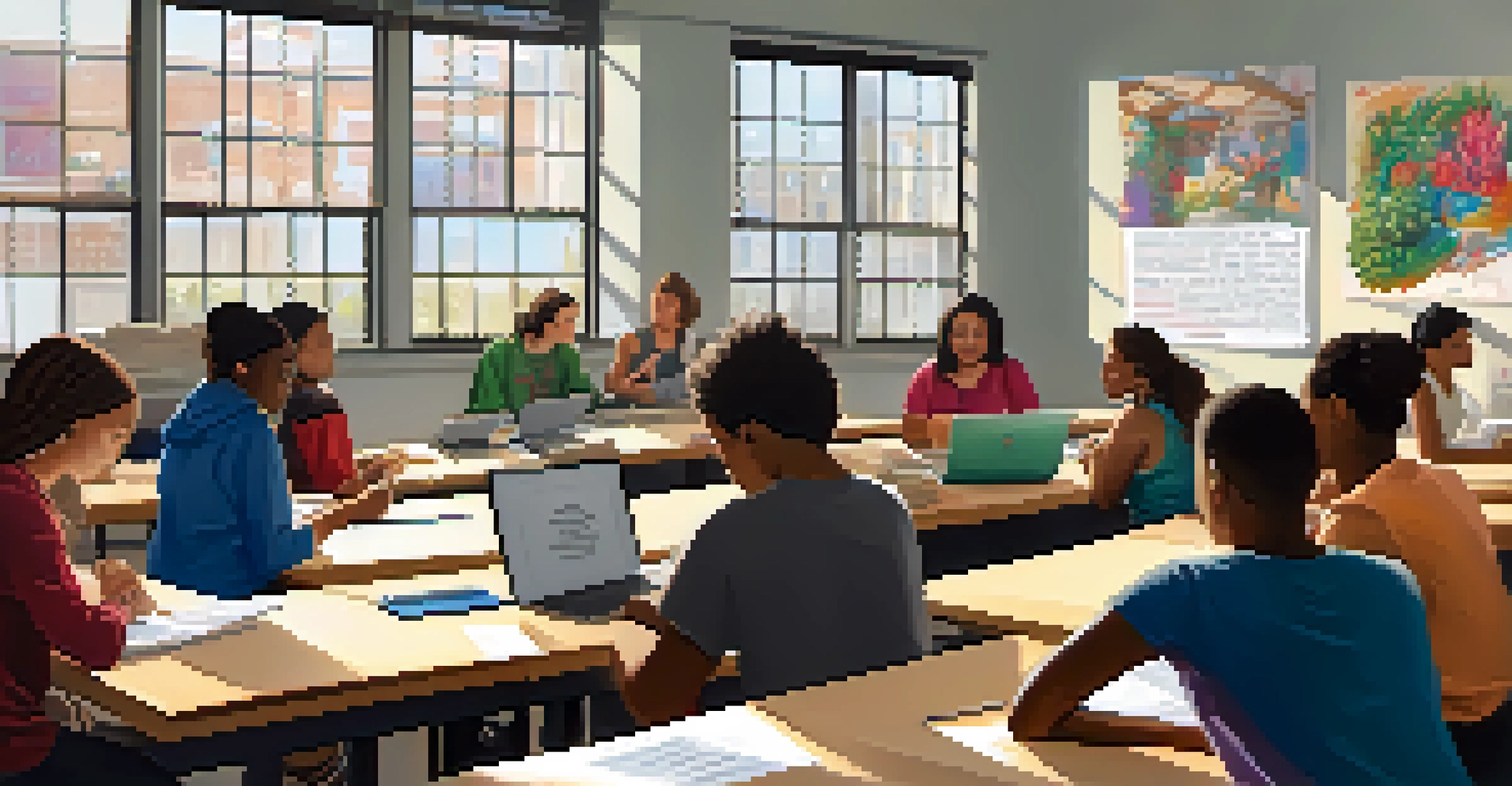Future of Higher Education in Memphis: Challenges and Solutions

Understanding the Current Landscape of Higher Education
Higher education in Memphis has seen both growth and challenges in recent years. With institutions like the University of Memphis and Rhodes College, the city boasts a diverse educational landscape. However, enrollment trends reveal a decline in traditional college-age students, raising questions about the future of these institutions.
Education is the most powerful weapon which you can use to change the world.
This decline is influenced by various factors, including demographic shifts and the rising cost of tuition. Many potential students are weighing the value of a degree against the financial burden it carries. As a result, colleges must adapt to meet the changing needs and expectations of students and their families.
To thrive, Memphis higher education must prioritize accessibility, affordability, and relevance. Creating pathways for non-traditional students and emphasizing career-focused programs can help institutions remain competitive and appealing.
Addressing Financial Barriers to Higher Education
One of the most pressing challenges facing students in Memphis is the high cost of education. Tuition fees, coupled with living expenses, can deter many potential students from pursuing a degree. This financial strain disproportionately affects low-income families, further widening the education gap.

To combat this issue, universities can explore innovative financial aid solutions. Scholarships, grants, and flexible payment plans can ease the burden on students and their families. Additionally, partnerships with local businesses can provide funding opportunities and internships that make education more attainable.
Addressing Financial Barriers
High tuition costs in Memphis are deterring students, highlighting the need for innovative financial aid solutions.
Ultimately, fostering a culture of financial literacy is essential. By equipping students with knowledge about budgeting, loans, and scholarship opportunities, we empower them to make informed decisions about their educational futures.
Embracing Technology in Higher Education
Technology is revolutionizing the way education is delivered, and Memphis institutions must keep pace. Online learning platforms and hybrid models have become increasingly popular, especially in the wake of the pandemic. These innovations offer flexibility and accessibility to students who may not be able to attend traditional classes.
The future belongs to those who believe in the beauty of their dreams.
However, the shift to technology-driven education also presents challenges. Not all students have equal access to the necessary tools and internet connectivity, creating a digital divide. Institutions must address these disparities to ensure that all students can benefit from technological advancements in education.
By investing in technology infrastructure and providing resources for students, Memphis colleges can enhance the learning experience. Offering training for faculty on effective online teaching methods will also ensure that the quality of education remains high, regardless of the delivery format.
Fostering Community and Industry Partnerships
Collaboration between higher education institutions and local industries is crucial for student success. By developing partnerships, colleges can create programs that align with workforce needs, ensuring that graduates are job-ready. This approach not only benefits students but also strengthens the local economy.
Internships, co-op programs, and mentorship opportunities can provide students with hands-on experience in their fields of study. Employers can play a vital role by actively engaging with educational institutions, sharing insights on skills they seek in potential hires. This collaboration creates a win-win scenario for both students and employers.
Embracing Technology in Education
The shift towards online and hybrid learning models offers flexibility but also requires addressing the digital divide among students.
Furthermore, community involvement can enhance educational offerings. Engaging local organizations in curriculum development ensures that programs are relevant and responsive to community needs. This approach can foster a sense of belonging and purpose among students, encouraging them to invest in their education and the community.
Promoting Diversity and Inclusion in Higher Education
Diversity and inclusion are essential components of a thriving educational environment. Memphis higher education institutions must strive to create a welcoming atmosphere for students from all backgrounds. This commitment goes beyond enrollment numbers; it involves fostering a culture that values diverse perspectives and experiences.
Implementing targeted recruitment strategies can help attract underrepresented groups to higher education. Additionally, providing support services, such as mentorship programs and cultural organizations, can enhance the student experience and promote retention. Institutions must prioritize creating spaces where all students feel valued and empowered.
Ultimately, a diverse student body enriches the learning experience for everyone. By embracing varied perspectives, Memphis colleges can prepare students to thrive in an increasingly global workforce, fostering empathy and understanding along the way.
The Role of Lifelong Learning in Modern Education
As the job market continues to evolve, the concept of lifelong learning has gained prominence. In Memphis, higher education institutions must adapt to serve not only traditional students but also adult learners seeking to upskill or change careers. This shift highlights the importance of flexible learning options and accessible resources.
Offering non-degree programs, workshops, and online courses can cater to the needs of busy professionals. By providing options that fit around work and family commitments, colleges can attract individuals who may have previously thought higher education was out of reach. This inclusivity can significantly benefit the local workforce.
Fostering Community Partnerships
Collaboration between higher education institutions and local industries is essential for ensuring graduates are job-ready and enhancing the local economy.
Encouraging a mindset of continuous learning prepares students for an ever-changing job landscape. As industries evolve, the importance of adaptability and skill enhancement cannot be overstated. Memphis colleges can play a crucial role in fostering this mentality, ensuring that individuals are equipped to thrive throughout their careers.
Navigating the Future: A Call to Action
The future of higher education in Memphis hinges on collaboration and innovation. By addressing the challenges head-on and implementing creative solutions, institutions can create a sustainable educational ecosystem. This effort requires the involvement of educators, policymakers, students, and the community.
Engaging in open dialogue about the needs and aspirations of students will help shape the direction of higher education. Stakeholders must work together to develop programs and policies that prioritize accessibility, affordability, and relevance. The collective vision can pave the way for a brighter future.

Ultimately, the goal is to empower Memphis students with the tools they need to succeed. A commitment to enhancing higher education will not only benefit individuals but also strengthen the community as a whole. Together, we can navigate the future of higher education and create lasting impact.